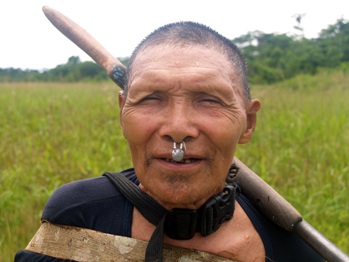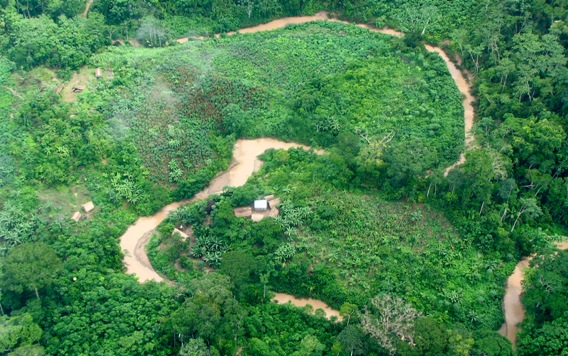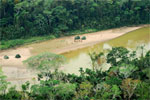Consumers in the US purchasing mahogany furniture may be unwittingly supporting illegal logging in a Peruvian reserve for uncontacted indigenous tribes, imperiling the indigenous peoples’ lives. A new report by the Upper Amazon Conservancy (UAC) provides evidence that loggers are illegally felling mahogany trees in the Murunahua Reserve where it is estimated some 200 uncontacted natives live.
“It would be a tragedy for US citizens to continue buying Peruvian mahogany if it puts the survival of uncontacted Indians at risk,” said Stephen Corry, director of Survival International, an indigenous rights organization, in a press release
According to the report, over 80 percent of mahogany exports from Peru end up in the US, making it very likely that illegally logged wood is entering the US market. In 2008 the US passed an amendment to the Lacey Act which outlaws the importation, possession, or sale of illegally sourced wood; however the UAC has found evidence that Peruvian illegal loggers are circumventing the law.
 Recently-contacted Murunahua man, south-east Peru. Photo: © Chris Fagan/Upper Amazon Conservancy. |
“They use forestry permits allocated for timber concessions or titled indigenous land, when really the wood has come from somewhere else,” David Hill, also of Survival International, told mongabay.com. “In other words, it is the very system designed to legalize the trade that is exploited for the illegal trade. An appalling irony.”
While oil and gas companies have recently been barred from the reserve due to fears for the natives’ safety, the UAC report alleges that logging is ‘widespread’ in the protected area, including logging roads and vehicles that bring the wood to a nearby river for transport.
Illegal loggers threaten uncontacted natives by more ways than cutting down the forest on which they depend: the illegal loggers spread disease. Uncontacted natives are especially vulnerable to disease due to a lack of natural defenses against illnesses they have not yet encountered. When some Muruhanua indigenous groups were first contacted in the 1990s—also by illegal loggers—populations were decimated: half the contacted natives perished from disease and violence.
“The only ways to stop this happening is for US buyers to reject any Peruvian mahogany, or the US government to ban exports temporarily. Until that happens, people in the US have no idea where the wood they’re buying is actually coming from,” says Hill.
To date Peru has turned a blind eye to logging in the reserve, yet Hill argues that it wouldn’t be difficult to put a halt to the illegal trade.
“Peru’s government needs to find the necessary political will and allocate the necessary resources to stop loggers entering uncontacted tribes’ land. What that means in practice is building control posts along the rivers, with all the requisite technical and financial support to permit them to do their job effectively,” says Hill. “The areas we’re talking about are very remote and there aren’t that many ways of gaining access: in other words, it’s a question of identifying which rivers the loggers use and then stopping them entering. It’s not rocket science.”

Illegal logging settlement inside the Murunahua Reserve for uncontacted tribes, south-east Peru. Photo: © Chris Fagan/Upper Amazon Conservancy.
Related articles
Spotted uncontacted native flees, leaving dinner and dish behind
(07/07/2010) The man had set up camp and was preparing to cook live turtles for a meal when he was seen by people he did not know. He hid behind a tree and then fled from the camp into the forest, abandoning his uncooked turtles and a clay pot behind.
Oil company to cut 454 kilometers of seismic lines in uncontacted tribe territory

(04/21/2010) Repsol YPF, a Spanish-Argentine oil company, plans to cut 454 kilometers (282 miles) of seismic lines in a territory of the Peruvian rainforest known to be home to uncontacted indigenous peoples, according to a press release from Survival International. To construct seismic lines paths will be cleared in the forest and explosives set-off regularly. Seismic lines allow energy companies to locate oil deposits by creating a cross sectional view of the subsurface.
Spanish oil company develops own rules for contacting uncontacted Amazon tribes

(03/26/2010) Imagine you’re in one of the remotest parts of the Amazon rainforest and suddenly you come across members of an uncontacted tribe. What should you do? The experts say, “Turn around. At all costs, make no attempt at contact.” Repsol YPF, exploring for oil in northern Peru, has taken a different approach. Despite the extreme vulnerability of the tribes to any form of contact, the company suggests that its workers talk to them in certain instances, and even provides specific phrases to use and conversation topics to address.